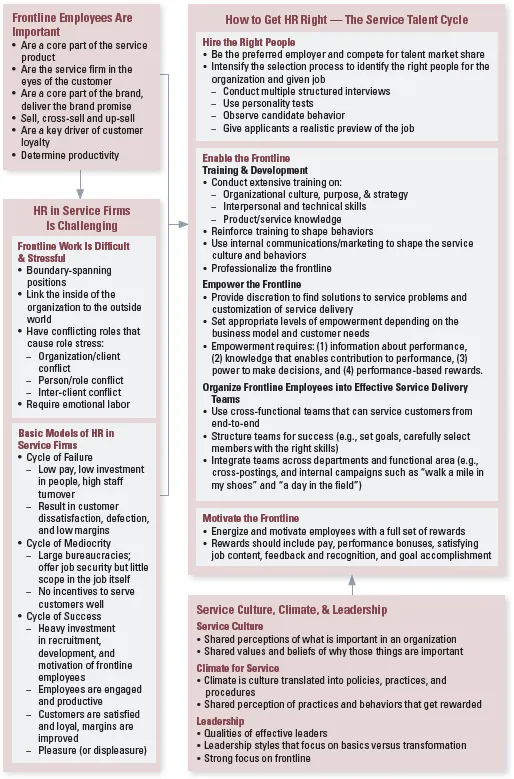![]()
VOLUME 9
Managing People for Service Advantage
Quintessentially we are a people-based company. You couldn’t find another consumer brand as dependent on human behavior.
Howard Schultz
CEO of Starbucks
The old adage ‘People are your most important asset’ is wrong. The right people are your most important asset.
Jim Collins
Consultant, teacher and author of best-selling book “Good to Great”
Customer satisfaction results from the realization of high levels of value compared to competitors… Value is created by satisfied, committed, loyal, and productive employees.
James l. Heskett, W. Earl Sasser, Jr., and Leonard L. Schlesinger
Current and former professors at Harvard Business School
Figure 1: Organizing framework — managing people for service advantage
SERVICE EMPLOYEES ARE EXTREMELY IMPORTANT
The quality of a service firm’s staff — especially those working in customer-facing positions — plays a crucial role in determining market success and financial performance. Frontline employees are a key asset for delivering service excellence and competitive advantage. Market and financial results of managing people effectively for service advantage can be phenomenal. That is why the People element of the 7 ‘P’s is so important.
Among the most demanding jobs in service businesses are the frontline jobs. Employees working in these customer-facing jobs span the boundary between inside and outside of the organization. They are expected to be fast and efficient in executing operational tasks, as well as courteous and helpful when dealing with customers.
Behind most of today’s successful service organizations stands a firm commitment to effective management of human resources (HR), including recruitment, selection, training, motivation, and retention of employees. Organizations that display this commitment understand the economic payoff from investing in their people. These firms are also characterized by a distinctive culture of service leadership and role modeling by its top management. Good HR strategies allied with strong management leadership at all levels often lead to a sustainable competitive advantage. It is probably harder for competitors to duplicate high-performance human assets compared to any other corporate resource.
Highly capable and motivated people are at the center of service excellence and productivity. Cora Griffith in Service Insights 1 is a powerful demonstration of a frontline employee delivering service excellence and productivity, and at the same time having high job satisfaction. Many of the pointers in Cora Griffith’s “nine rules of success” are the result of good HR strategies for service firms. This volume will give an insight on how to get HR right in service firms, and how to get satisfied, loyal, motivated and productive service employees (Figure 1).
SERVICE INSIGHTS 1
Cora Griffith — The Outstanding Waitress1
Cora Griffith, a waitress for the Orchard Café at the Paper Valley Hotel in Appleton, Wisconsin, is superb in her role, appreciated by first-time customers, famous with her regular customers, and revered by her co-workers. Cora loves her work — and it shows. Comfortable in a role that she believes is the right one for her, Cora follows nine rules of success:
1.Treat Customers Like Family. First-time customers are not allowed to feel like strangers. Cheerful and proactive, Cora smiles, chats, and includes everyone at the table in the conversation. She is as respectful to children as she is to adults, and makes it a point to learn and use everyone’s name. “I want people to feel like they’re sitting down to dinner right at my house. I want them to feel they’re welcome, that they can get comfortable, and that they can relax. I don’t just serve people, I pamper them”.
2.Listen First. Cora has developed her listening skills to the point that she rarely writes down customers’ orders. She listens carefully and provides a customized service: “Are they in a hurry? Or do they have a special diet or like their selection cooked in a certain way?”
3.Anticipate Customers’ Wants. She refills beverages and brings extra bread and butter in a timely manner. One regular customer, for example, who likes honey with her coffee, gets it without having to ask. “I don’t want my customers to have to ask for anything, so I always try to anticipate what they might need”.
4.Simple Things Make the Difference. She manages the details of her service, monitoring the cleanliness of the utensils and their correct placement. The fold for napkins must be just right. She inspects each plate in the kitchen before taking it to the table. She provides crayons for small children to draw pictures while waiting for the meal. “It’s the little things that please the customer”, she says.
5.Work Smart. Cora scans all her tables at once, looking for opportunities to combine tasks. “Never do just one thing at a time”, she advises. “And never go from the kitchen to the dining room empty-handed. Take coffee or iced tea or water with you”. When she refills one glass of water, she refills others. When clearing one plate, she clears others. “You have to be organized, and you have to keep in touch with the big picture”.
6.Keep Learning. Cora makes it an ongoing effort to improve existing skills and learn new ones.
7.Success Is Where You Find It. Cora is content with her work. She finds satisfaction in pleasing her customers, and she enjoys helping other people enjoy. Her positive attitude is a positive force in the restaurant. She is hard to ignore. “If customers come to the restaurant in a bad mood, I’ll try to cheer them up before they leave”. Her definition of success: “To be happy in life”.
8.All for One, One for All. Cora has been working with many of the same co-workers for more than eight years. The team supports one another on the crazy days when 300 conventioneers come to the restaurant for breakfast at the same time. Everyone pitches in and helps. The wait staff cover for one another, the managers bus the tables, and the chefs garnish the plates. “We are like a little family”, Cora says. “We know each other very well and we help each other out. If we have a crazy day, I’ll go in the kitchen towards the end of the shift and say, ‘Man, I’m just proud of us. We really worked hard today.’”
9.Take Pride in Your Work. Cora believes in the importance of her work and in the need to do it well. “I don’t think of myself as ‘just a waitress’…I’ve chosen to be a waitress. I’m doing this to my full potential, and I give it my best. I tell anyone who’s starting out: ‘Take pride in what you do’. You’re never just an ‘anything’, no matter what you do. You give it your all…and you do it with pride”.
Cora Griffith is a success story. She is loyal to her employer and dedicated to her customers and co-workers. A perfectionist who seeks continuous improvement, Cora’s enthusiasm for her work and unflagging spirit creates an energy that radiates through the restaurant. She is proud of being a waitress, proud of ‘touching lives’. Says Cora: “I have always wanted to do my best. However, the owners really are the ones who taught me how important it is to take care of the customer and gave me the freedom to do it. The company always has listened to my concerns and followed up. Had I not worked for the Orchard Café, I would have been a good waitress, but I would not have been the same waitress”.
Service Personnel as a Source of Customer Loyalty and Competitive Advantage
Almost everybody can recount a dreadful experience they had with a service business. If pressed, many of these same people can also recount a really good service experience. Service personnel usually feature prominently in such dramas. They either feature in roles as uncaring, incompetent, mean-spirited villains, or in roles as heroes who went out of their way to help customers by anticipating their needs and resolving problems in a helpful and empathetic manner. Everybody has their own set of favorite stories, featuring both villains and heroes — and most people talk more about the former than the latter.
From a customer’s perspective, the encounter with service staff is probably the most important aspect of a service. From the firm’s perspective, the service levels and the way service is delivered by frontline personnel can be an important source of differentiation as well as competitive advantage. Among the reasons why service employees are so important to customers and the firm’s competitive positioning are that the frontline:
•Is a core part of the product. Often, the service employees are the most visible element of the service. They deliver the service, and greatly affect service quality.
•Is the service firm. Frontline employees represent the service firm, and from a customer’s perspective, they are the firm.
•Is the brand. Frontline employees and the service they provide are often a core part of the brand. It is the employees who determine whether the brand promise is delivered.2
•Affects sales. Service personnel are often critically important for generating sales, cross-sales, and up-sales.
•Is a key driver of customer loyalty. Frontline employees play a key role in anticipating customers’ needs, customizing the service delivery, and building personalized relationships with customers.3 An effective performance of these activities should ultimately lead to increased customer loyalty.
•Determines productivity. Frontline employees have heavy influence on the productivity of frontline operations.
The story of Cora Griffith and many other success stories of employees showing discretionary effort have reinforced the truism that highly motivated people are at the core of service excellence.4 Increasingly, they are a key factor in creating and maintaining competitive positioning and advantage.
The intuitive importance of the effect of service employees on customer loyalty was integrated and formalized by James Heskett and his colleagues in their pioneering research on what they call the service-profit chain. It demonstrates the chain of relationships among (1) employee satisfaction, retention, and productivity; (2) service value; (3) customer satisfaction and loyalty; and (4) revenue growth and profitability for the firm.5 Unlike manufacturing, “shop-floor workers” in services (i.e., frontline staff) are in constant contact with customers, and there is solid evidence showing that employee satisfaction and customer satisfaction are highly correlated.6 Therefore, this volume focuses on how to have satisfied, loyal and, productive service employees who care.
The Frontline in Low-Contact Services
Much research in service management relates to high-contact services. However, many services are moving towards using low-contact delivery channels such as call centers, where contact is voice-to-voice rather than face-to-face. A growing number of self-service transactions no longer involve frontline staff. As a result, a large and increasing number of customer contact employees work by telephone or e-mail, never meeting customers face-to-face. In the light of these trends, are frontline employees really all that important for such services?
Figure 2: The pleasant personality of call center staff can result in a positive “moment of truth”, where a firm’s service quality will be viewed positively
Most people do not call the service hotline or visit the service center of their cell phone service operator or credit card companies more than once or twice a year. However, these occasional service encounters are absolutely critical — they are the “moments of truth” that drive a customer’s perceptions of the service firm (Figure 2). Also, ...


